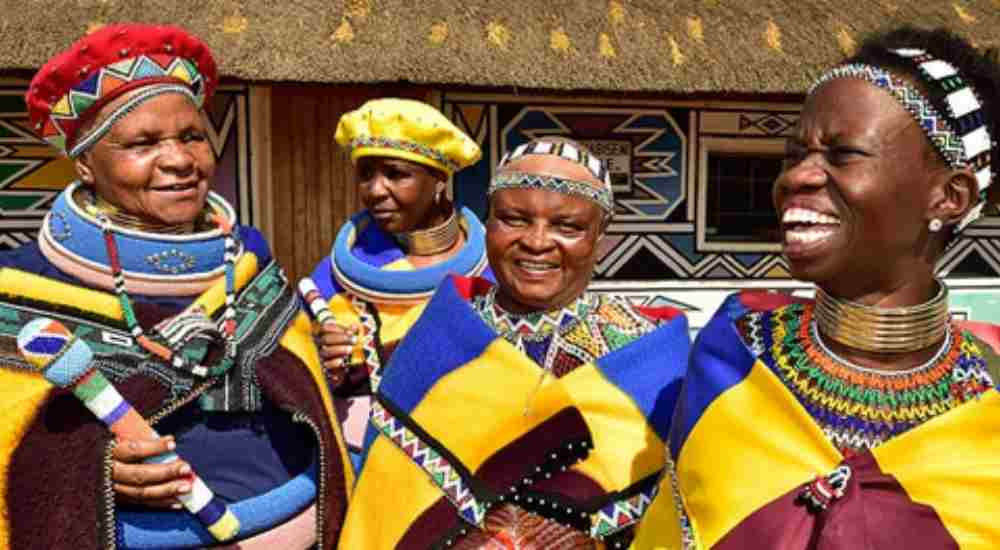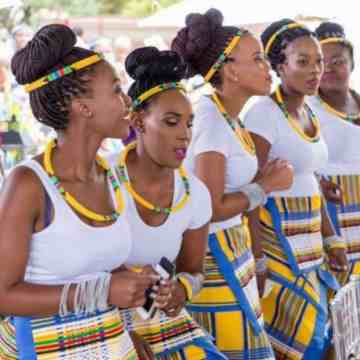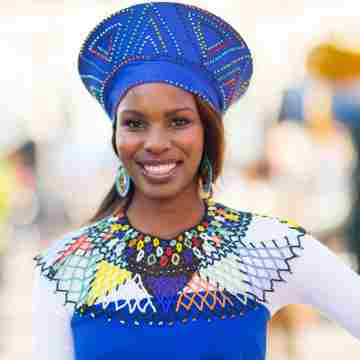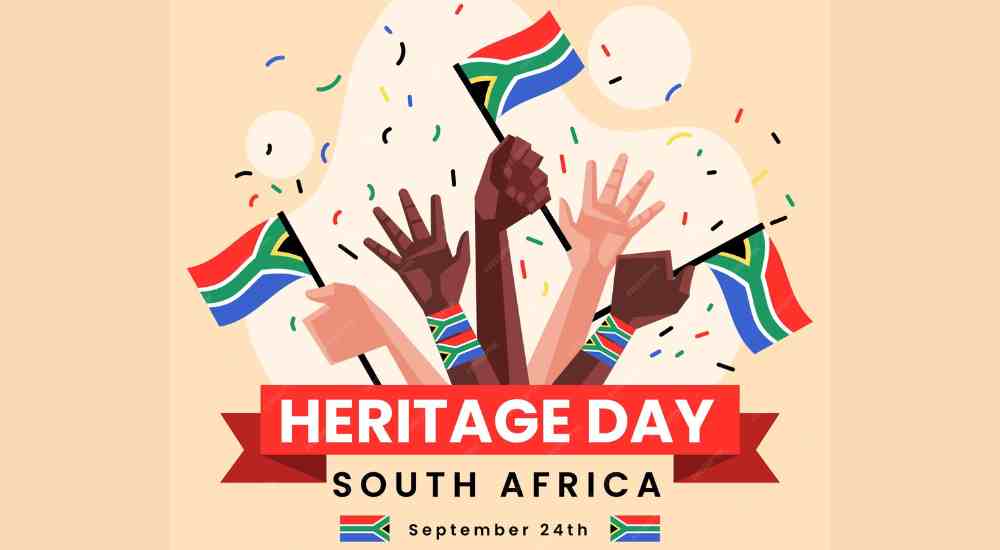South Africa’s Heritage Day, observed on September 24, is a vibrant tapestry woven from the threads of a nation’s diverse cultures. In this rainbow-colored land, where diversity is a treasure, Heritage Day stands as a beacon of unity and inclusivity. It beckons all to partake in a celebration of identity, tradition, and shared history. As we embark on this journey through South Africa’s cultural mosaic, we invite you to join in this revelry, where every shade of culture contributes to the vibrant portrait of the ‘Rainbow Nation.’ It’s a day to embrace, appreciate, and celebrate the rich heritage that makes South Africa truly unique.
Understanding South Africa’s Cultural Tapestry
South Africa: The Rainbow Nation
In the heart of southern Africa lies a nation unlike any other, rightfully earning the moniker ‘Rainbow Nation.’ This vivid and poetic title captures the essence of South Africa’s remarkable diversity – a land where various cultures, languages, and traditions converge, creating a breathtaking kaleidoscope of identities. From the rhythmic beats of Zulu dance to the soul-stirring melodies of Xhosa songs, South Africa’s cultural tapestry weaves together a vibrant mosaic that reflects its people’s deep-rooted heritage.
Heritage Day: Embracing Diversity
At the core of this remarkable nation, South Africa’s Heritage Day stands as a testament to the country’s commitment to celebrating its rich and multifaceted heritage. It is a day where the past and the present harmonize, as people from all walks of life unite to honor their cultural roots. Yet, Heritage Day is not merely a celebration; it is an embodiment of acceptance. It extends its embrace to all races and genders, fostering an environment of unity and respect for differences.
Culture: The Shaper of Identity
Culture is the silent sculptor of a nation’s identity and values. It molds the beliefs, customs, and traditions that thread through the tapestry of history. In South Africa, culture transcends the boundaries of ethnicity, serving as a shared treasure chest of stories, rituals, and legacies. It provides the compass by which the ‘Rainbow Nation’ navigates its journey towards a more harmonious and inclusive future.
Heritage Day invites us to delve into this remarkable tapestry, to understand the threads that bind South Africa’s people, and to appreciate the beauty in their differences. It reminds us that, in celebrating culture, we are celebrating the very essence of a nation.
History of Heritage Day

Shaka Day: Celebrating Unity
In the picturesque landscapes of KwaZulu-Natal, the 24th of September was long known as Shaka Day. It was a day imbued with historical significance, commemorating the life and legacy of Shaka, the Zulu king of southern Africa. Shaka, a towering figure in the annals of history, played an instrumental role in forging unity among the disparate Zulu clans, transforming them into a formidable and cohesive nation. His leadership laid the foundation for the Zulu people, and his presumed date of death, September 24, became a day of reflection and remembrance.
From Exclusion to Embrace
However, when South Africa underwent transformative changes, and the shadow of apartheid began to recede, Shaka Day faced an uncertain future. In 1995, a request to confirm it as an official holiday was met with rejection. This omission raised concerns and objections, particularly from the Inkatha Freedom Party (IFP), a political party with a significant Zulu membership. The debate ignited a crucial dialogue within the nation.
The Birth of Heritage Day
Out of this dialogue emerged a compromise that would shape the nation’s calendar and ethos. The day was rechristened ‘Heritage Day,’ a name that encapsulates the celebration of cultural diversity and unity. This change marked a significant shift, symbolizing South Africa’s journey from a fractured past to a united future.
Heritage Day now embodies the spirit of a ‘Rainbow Nation,’ celebrating the contributions of all South Africans in building a harmonious and inclusive society. It stands as a testament to the power of dialogue, compromise, and a shared vision for a better tomorrow.
As we celebrate Heritage Day, we pay tribute not only to the legacy of Shaka but also to the resilience and strength of a nation that continues to evolve, heal, and embrace its rich cultural tapestry.
Celebrating South African Culture
South Africans come together on Heritage Day, September 24, in a jubilant display of cultural pride and unity. This day is a vibrant tapestry woven with diverse traditions, and it is celebrated in various meaningful ways:

1. The Braai Tradition: A Sizzling Celebration
A central feature of Heritage Day celebrations is the ‘braai,’ a South African barbecue that sizzles with cultural significance. Families and friends gather to ignite open flames, share laughter, and cook a delectable feast. The aroma of grilled meats wafts through the air as people bond over this shared culinary tradition. It’s a time when the tantalizing scents of boerewors, sosaties, and steak fill the air, creating a sensory experience like no other.
2. Embracing Tradition through Attire
Many South Africans choose to don traditional attire on this day, a gesture that reflects their pride in their cultural heritage. The streets and gatherings become a kaleidoscope of vibrant colors and patterns, each outfit telling a unique story of history and tradition.
3. Events Across the Nation
Throughout the country, various events and commemorations take place to mark this special day. In Gugulethu, a historic township, former Western Cape Provincial Premier Ebrahim Rasool addressed the public in a Heritage Day celebration. In Hout Bay, an army procession and a reenactment of a significant battle pay homage to the nation’s history.
The Proposal to Rename: National Braai Day
In 2005, a spirited media campaign led by Jan Scannell, affectionately known as “Jan Braai,” suggested renaming Heritage Day as ‘National Braai Day.’ The proposal aimed to celebrate South Africa’s rich tradition of informal backyard barbecues, known as braais. Archbishop Desmond Tutu, an iconic figure in South African history, lent his support to the idea, believing it could serve as a unifying force in a country still healing from its past divisions. He even joined in the festivities, donning an apron and savoring a boerewors sausage.
In 2008, the initiative received the endorsement of South Africa’s National Heritage Council, further solidifying the braai’s place in the nation’s cultural identity. While the day is still officially recognized as Heritage Day, the idea of National Braai Day continues to be celebrated, underscoring the importance of shared traditions and the role they play in fostering unity and connection among all South Africans.
Heritage Day Timeline
1828 – The King is Dead: Shaka, the Zulu king known for his role in uniting the Zulu clans into a cohesive nation, passes away. This date, September 24, eventually becomes a remembrance day in his honor.
1995 – Rejected and Neglected: The Public Holidays Bill presented to the Parliament of South Africa does not include September 24 on the list of official public holidays.
1996 – Heritage Proof: Nelson Mandela, a symbol of unity and change in post-Apartheid South Africa, addresses the nation on Heritage Day. He emphasizes that this day allows the country’s heritage to help build a new nation, highlighting the importance of embracing diversity.
2007 – Let’s Talk Heritage: Ebrahim Rasool, a prominent South African politician, addresses the public at a Heritage Day gathering in Gugulethu, emphasizing the importance of celebrating cultural heritage.
2008 – The Holiday is Finally Embraced: After initial resistance and the proposal to rename it ‘National Braai Day,’ the National Heritage Council endorses Heritage Day. This significant moment solidifies the day’s importance in celebrating South Africa’s diverse heritage and its role in fostering unity and reconciliation among all its people.
How to Celebrate Heritage Day

Discover South African Heritage: Begin your Heritage Day celebration by diving into South Africa’s captivating history and culture. Explore books, documentaries, and films that offer insights into the nation’s rich and diverse heritage. Learn about iconic figures like Nelson Mandela, historical events, and the complex tapestry of traditions that have shaped this ‘Rainbow Nation.’
Host a Braai Barbecue: Embrace the heart of South African culture by hosting your very own Braai barbecue. This culinary tradition has been an integral part of South African life for generations. Fire up the grill, sizzle some delicious meats, and don’t forget the sides – whether it’s pap, bread, or veggies cooked over an open fire. Sharing a braai with family and friends is not just about the food; it’s about the bonds you create and the stories you share around the fire.
Share the Celebration: Heritage Day is all about coming together. Invite friends and family to join your braai or attend a community event celebrating this special day. The more diverse the group, the richer the experience. Exchange stories, traditions, and dishes with others, and let the spirit of unity and inclusion shine through.
Document and Share on Social Media: In the age of social media, you can connect with people from all corners of the globe. Share your Heritage Day experience with the world by using hashtags like #heritageday or #braaiday. Post pictures, videos, and thoughts about your celebration. It’s a great way to learn from others and spread the message of cultural appreciation and togetherness.
Support Local Artisans: Take this opportunity to support local artisans and craftsmen who create traditional South African products. Whether it’s jewelry, clothing, or artwork, these items often carry a piece of South Africa’s heritage within them. By purchasing from local artisans, you contribute to preserving their craft and the stories they tell.
Learn and Participate: Many communities organize special Heritage Day events, from cultural performances to exhibitions. Attend these events to witness the diverse traditions and talents of South Africa. You might even get a chance to participate in traditional dances or taste regional dishes from various cultures.
Teach the Next Generation: Pass down the appreciation for South African heritage to the younger generations. Share stories, recipes, and cultural knowledge with children and grandchildren. Encourage them to ask questions and explore their roots. By doing so, you ensure that the legacy of Heritage Day lives on for years to come.
5 Fascinating Facts About Heritage Day
Also Known as National Braai Day: While officially called Heritage Day, this holiday is sometimes affectionately referred to as National Braai Day. It celebrates the informal backyard barbecue tradition known as a braai, emphasizing its role in fostering unity and togetherness among South Africans.
African Dominance: South Africa boasts a population where Africans make up a significant 79%. This diversity is one of the reasons behind the country’s ‘Rainbow Nation’ nickname, which celebrates the multitude of cultures and backgrounds that coexist within its borders.
First Celebrated in 1995: The inaugural celebration of Heritage Day took place in 1995. Since then, it has become an annual event, uniting South Africans in commemorating their rich cultural heritage.
UNESCO-Recognized Heritage Sites: South Africa proudly boasts 10 heritage sites recognized by the United Nations Educational, Scientific and Cultural Organisation (UNESCO). These sites offer a glimpse into the nation’s historical and cultural treasures, showcasing the depth of its heritage.
Diverse Braais: The term ‘braai’ doesn’t refer to a single cooking method. South Africans have various styles of barbecues, including Potjies (pot stew), Shisha Nyama (grilled meat), and Spit Braais. Each style reflects the country’s diverse culinary traditions and adds a flavorful touch to Heritage Day celebrations.
Why We Cherish Heritage Day
Promoting Unity and Easing Tensions: Heritage Day stands as a symbol of unity and harmony in South Africa. In a nation historically marked by divisions, this day serves as a beacon of hope, fostering understanding and respect among its diverse population. It offers an opportunity to bridge gaps and heal old wounds, reminding everyone that they are part of the same ‘Rainbow Nation.’
The Joy of Braai Barbecue: Few things bring people together like a hearty barbecue, and South Africa’s braai is no exception. It’s a time-honored tradition that transcends cultural boundaries, where family and friends gather around an open fire to share stories, laughter, and, of course, delicious food. The act of braai embodies the essence of Heritage Day, as it showcases the beauty of togetherness and celebration.
Embracing the Richness of South Africa’s Culture: South Africa’s cultural tapestry is incredibly diverse and vibrant, reflecting the nation’s complex history. Heritage Day is a reminder of the treasures within this cultural mosaic. It encourages South Africans to explore, appreciate, and celebrate the customs, languages, and traditions that make their country unique. By embracing this rich heritage, individuals can truly understand the depth of South Africa’s identity and the value of each of its components.
Conclusion
As we draw our exploration of South Africa’s Heritage Day to a close, it’s evident that this celebration holds a special place in the hearts of all South Africans. It’s a day that speaks volumes about the nation’s rich and diverse heritage, aptly earning it the nickname ‘Rainbow Nation.’ The significance of Heritage Day lies in its power to foster unity and inclusivity, transcending racial and gender boundaries.

